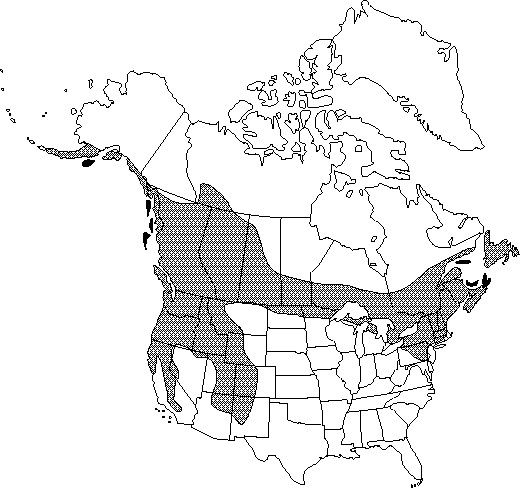Difference between revisions of "Ranunculus flammula var. ovalis"
Bull. Torrey Bot. Club 69: 305. 1942.
FNA>Volume Importer |
imported>Volume Importer |
||
| Line 40: | Line 40: | ||
|habitat=Muddy ground or shallow water | |habitat=Muddy ground or shallow water | ||
|elevation=0-2900 m | |elevation=0-2900 m | ||
| − | |distribution=Alta.;B.C.;Man.;N.B.;Nfld.;N.W.T.;N.S.;Ont.;P.E.I.;Que.;Sask.;Alaska;Ariz.;Calif.;Colo.;Conn.;Idaho;Maine;Mass.;Mich.;Minn.;Mont.;Nev.;N.H.;N.Mex.;N.Y.;N.Dak.;Oreg.;Pa.;Utah;Vt.;Wash.;Wyo. | + | |distribution=Alta.;B.C.;Man.;N.B.;Nfld. and Labr. (Nfld.);N.W.T.;N.S.;Ont.;P.E.I.;Que.;Sask.;Alaska;Ariz.;Calif.;Colo.;Conn.;Idaho;Maine;Mass.;Mich.;Minn.;Mont.;Nev.;N.H.;N.Mex.;N.Y.;N.Dak.;Oreg.;Pa.;Utah;Vt.;Wash.;Wyo. |
|discussion=<p><i>Ranunculus flammula </i>var.<i> ovalis</i>, as currently understood, is heterogeneous. Many specimens from throughout the cited range scarcely differ from specimens of <i>R. flammula </i>var.<i> reptans</i> and perhaps should be included in the latter variety. Material from the Pacific slope, however, may be intermediate between <i>R. flammula </i>var.<i> reptans</i> and <i>R. flammula </i>var.<i> flammula</i> or may show various combinations of the distinguishing characteristics of the two. Biosystematic study of <i>R. flammula</i> as a whole will be needed for a meaningful treatment of these populations to be possible.</p> | |discussion=<p><i>Ranunculus flammula </i>var.<i> ovalis</i>, as currently understood, is heterogeneous. Many specimens from throughout the cited range scarcely differ from specimens of <i>R. flammula </i>var.<i> reptans</i> and perhaps should be included in the latter variety. Material from the Pacific slope, however, may be intermediate between <i>R. flammula </i>var.<i> reptans</i> and <i>R. flammula </i>var.<i> flammula</i> or may show various combinations of the distinguishing characteristics of the two. Biosystematic study of <i>R. flammula</i> as a whole will be needed for a meaningful treatment of these populations to be possible.</p> | ||
|tables= | |tables= | ||
| Line 59: | Line 59: | ||
|habitat=Muddy ground or shallow water | |habitat=Muddy ground or shallow water | ||
|elevation=0-2900 m | |elevation=0-2900 m | ||
| − | |distribution=Alta.;B.C.;Man.;N.B.;Nfld.;N.W.T.;N.S.;Ont.;P.E.I.;Que.;Sask.;Alaska;Ariz.;Calif.;Colo.;Conn.;Idaho;Maine;Mass.;Mich.;Minn.;Mont.;Nev.;N.H.;N.Mex.;N.Y.;N.Dak.;Oreg.;Pa.;Utah;Vt.;Wash.;Wyo. | + | |distribution=Alta.;B.C.;Man.;N.B.;Nfld. and Labr. (Nfld.);N.W.T.;N.S.;Ont.;P.E.I.;Que.;Sask.;Alaska;Ariz.;Calif.;Colo.;Conn.;Idaho;Maine;Mass.;Mich.;Minn.;Mont.;Nev.;N.H.;N.Mex.;N.Y.;N.Dak.;Oreg.;Pa.;Utah;Vt.;Wash.;Wyo. |
|reference=None | |reference=None | ||
|publication title=Bull. Torrey Bot. Club | |publication title=Bull. Torrey Bot. Club | ||
|publication year=1942 | |publication year=1942 | ||
|special status=Endemic | |special status=Endemic | ||
| − | |source xml=https:// | + | |source xml=https://bibilujan@bitbucket.org/aafc-mbb/fna-data-curation.git/src/bb6b7e3a7de7d3b7888a1ad48c7fd8f5c722d8d6/coarse_grained_fna_xml/V3/V3_761.xml |
|genus=Ranunculus | |genus=Ranunculus | ||
|subgenus=Ranunculus subg. Ranunculus | |subgenus=Ranunculus subg. Ranunculus | ||
Revision as of 23:05, 27 May 2020
Stems prostrate or sometimes ascending, 0.5-2 mm thick. Leaf blades lance-elliptic to lanceolate or linear, 0.8-3.3 × 0.2-0.8 cm. Flowers: sepals 2-3 mm; petals 3-5 × 2-3 mm. 2n = 32.
Phenology: Flowering spring–summer (May–Sep).
Habitat: Muddy ground or shallow water
Elevation: 0-2900 m
Distribution

Alta., B.C., Man., N.B., Nfld. and Labr. (Nfld.), N.W.T., N.S., Ont., P.E.I., Que., Sask., Alaska, Ariz., Calif., Colo., Conn., Idaho, Maine, Mass., Mich., Minn., Mont., Nev., N.H., N.Mex., N.Y., N.Dak., Oreg., Pa., Utah, Vt., Wash., Wyo.
Discussion
Ranunculus flammula var. ovalis, as currently understood, is heterogeneous. Many specimens from throughout the cited range scarcely differ from specimens of R. flammula var. reptans and perhaps should be included in the latter variety. Material from the Pacific slope, however, may be intermediate between R. flammula var. reptans and R. flammula var. flammula or may show various combinations of the distinguishing characteristics of the two. Biosystematic study of R. flammula as a whole will be needed for a meaningful treatment of these populations to be possible.
Selected References
None.